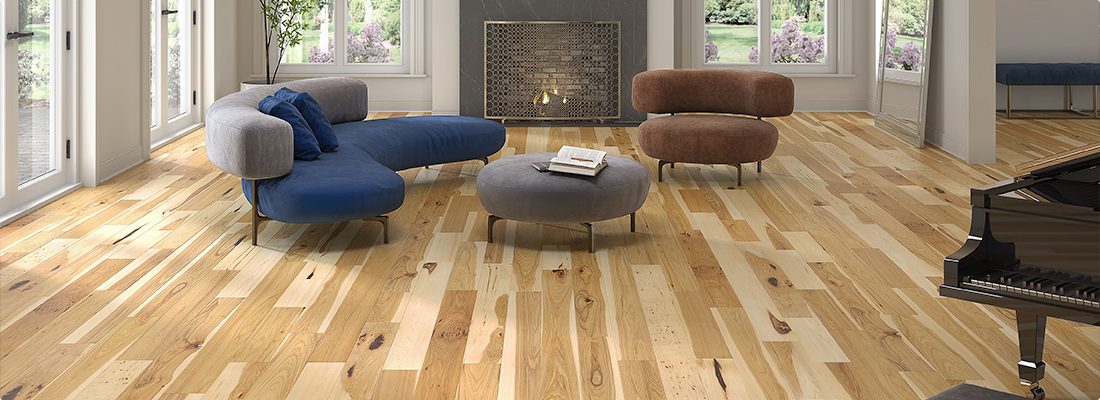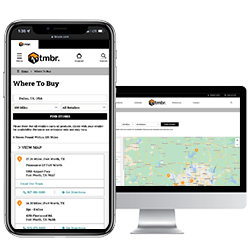Sustainable Hardwood Flooring for Your Home
February 23, 2024 | By tmbr® Product Expert

Homeowners know how beautiful hardwood floors look in a home. Plus, most homeowners know they can increase their home’s resale value. But did you know that wood flooring is one of the more sustainable flooring options?
Compared with numerous other building materials, wood is a renewable resource. Flooring manufacturers can renew supplies by planting new trees and ensuring they harvest trees from sustainably managed forests.
Moreover, wood is biodegradable and breaks down naturally. It also has the advantage of reuse. You can repurpose wood for other building or home improvement projects.
That’s not the case with plastic-based flooring, for example.
Does Sustainability Even Matter?
You might think people only give lip service to sustainability. But increasingly, studies show that consumers value environmentally conscious products.
For example, the Baker Retailing Center at the University of Pennsylvania conducted a study in January 2022. It found that more than two-thirds of consumers would pay more for sustainable products.
They buy eco-friendly brands to reduce waste and carbon emissions and help the environment significantly. But they’re also concerned about animal welfare, social signaling, and environmental improvement.
The 6 R’s of Sustainability
Practical Action is an international development group. It focuses on building sustainable lives and livelihoods with people on the frontlines of poverty and climate change. They refer to the 6 R’s of sustainability:
• Reduce
• Reuse
• Recycle
• Rethink
• Refuse
• Repair
Eco-friendly hardwood wood flooring meets each of those criteria.
What Makes Wood Flooring Sustainable?
As mentioned, wood is a renewable resource. Sustainable forest management organizations like the Forest Stewardship Council (FSC) ensure sustainable harvesting practices. It also includes FSC certification, ensuring products come from responsibly managed forests that provide environmental, social, and economic benefits.
Additionally, eco-friendly engineered hardwoods reduce the wood used in their construction. You can reuse it for other purposes, so it doesn’t wind up in landfills.
Even if you do not reuse the flooring, you can recycle engineered and solid hardwood flooring. You can use leftover planks to build a table or bookshelf. Or embellish walls by adding the planks for eye-catching appeal.
You can not only repair wood flooring. But, more importantly, you can extend its life by sanding and refinishing floors. As a result, by buying sustainable wood flooring, you ensure your floors will be around for a long time. Again, that results in less landfill materials.
Consider that nearly 90 percent of carpeting ends up in landfills. Millions of pounds of vinyl and laminate flooring turn into waste annually.
Wood Flooring Has a Low Carbon Footprint
Wood floors have a lower carbon footprint compared to synthetic flooring options. For example, trees absorb and store carbon dioxide, reducing greenhouse gases in the atmosphere.
Moreover, their production emits fewer volumes of greenhouse gases that trap and release heat into the environment. For example, the manufacturing of carpeting typically has a high carbon footprint.
That carbon neutrality remains intact through the service life of the wood. It stores carbon continuously, whether people use it in furniture, picture frames, or wood flooring.
When used for flooring, the wood acts as a long-term carbon sink. It locks in carbon and minimizes its release back into the atmosphere. So, investing in wood floors helps combat climate change and reduce environmental impact.
Flooring with natural materials like wood or cork has lower carbon and embodied energy footprints. So, its production emits fewer volumes of greenhouse gases that can trap and release heat to affect climate change. For instance, carpeting typically carries a high carbon footprint.
Wood Has a Smaller Environmental Impact
Studies indicate that wood is more environmentally friendly compared to other building materials. Wood causes less pollution and waste and requires less energy and resources.
Wood’s lifetime embodied energy – the amount consumed through the production process – is also less. It’s over three times lower than steel, plastic, and concrete. Each of those requires more effort and resources to dispose of at the end of their useful life.
Wood byproducts like bark and shavings can contribute to biofuels or other building materials.
Domestic Hardwoods are the Most Eco-Friendly
Hardwoods from North America, like ash, maple, oak, and hickory flooring, support sustainability in several ways versus more exotic hardwoods.
According to the World Resources Institute, forests in the Northern Hemisphere have net growth. Indeed, forests are also growing faster everywhere because of climate change itself.
Equally important, when we harvest a cubic foot of trees, we replant roughly 1.66 cubic feet (
Citizen Sustainable).
Moreover, importing exotic hardwoods impacts the carbon footprint because of shipping requirements.
Additional Benefits of Sustainable Wood Flooring
In addition to the sustainability benefits, there are many other reasons to choose wood flooring for your home. Here are a few:
Beauty and style: Wood flooring is timeless and classic. It can add warmth and character to any room.
Improved indoor air quality: Wood flooring does not harbor allergens and dust mites like carpeting can. This can help to improve indoor air quality and reduce allergy and asthma symptoms.
Increased home value: Wood flooring can increase the value of your home.
By installing wood floors, you’ll not only contribute to a healthier environment. You’ll also enjoy their beauty, potentially for generations.
Sustainable Wood Flooring from TMBR®
TMBR® Flooring commits to providing sustainable wood flooring products. We source our wood from responsibly managed forests and use manufacturing processes that minimize environmental impact.
Most of our engineered hardwoods come with a 50-year residential warranty. So, you’ll enjoy your floors for years while contributing to a more eco-conscious world.
You can find the nearest TMBR retailer using our store locator. Or give us a call at 1.866.243.2726.

Ready to shop for tmbr® flooring near you?
Use our retail locator to find where you can buy tmbr® engineered flooring products.
Find a Store